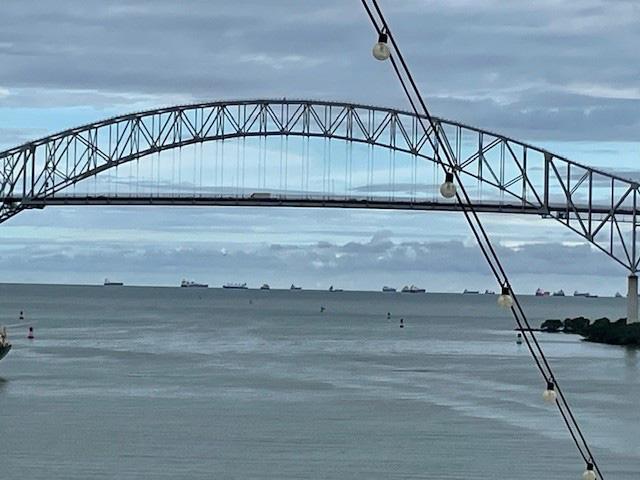Cash Market Moves
Red Sea Turmoil Hampers Suez Canal Transit; Panama Canal Still Problematic
As the Houthis continue to attack vessels transiting the Red Sea, shippers are faced with rising war risk premiums, higher freight costs, surcharges and longer transit times. Meanwhile, the Panama Canal is still limiting the number of daily vessel transits to 24, down from 36 during normal navigation conditions, increasing transit delays and causing shippers to look for alternative, more expensive routes.
The Federal Maritime Commission (FMC) announced recently on its website that it will hold an informal public hearing on Feb. 7, 2024, to examine how conditions in the Red Sea and Gulf of Aden regions are impacting commercial shipping and global supply chains. The hearing will allow stakeholders in the supply chain to communicate with the FMC how operations have been disrupted by attacks on commercial shipping emanating from Yemen, steps taken in response to these events and the resulting effects. In addition, the hearing will allow the FMC to gather information and identify any new issues related to these disruptions subject to FMC statutes, such as implementing contingency fees and surcharges, noted the announcement.
"The Red Sea is a big mess," Jay O'Neil of HJ O'Neil Commodity Consulting told DTN. "Unfortunately, the problems there keep expanding rather than improving. No simple answers there and looks like it could be many months before anything gets better and probably will continue to get worse before any relief comes. More and more vessels of all types are avoiding the Red Sea and therefore the Suez Canal."
O'Neil attended the U.S. Grain Council Regional Buyers Conference in Cancun, Mexico, over the Jan. 19 weekend. From conference presentations and various conversations, O'Neil noted that while the rainy season in Panama does not usually start until May, there is no telling, of course, how the rain amounts end up.
"Current restrictions will likely stay in place through July, and then Panama Canal Authority (ACP) will reassess things. The vessel booking slots will remain at 24 for the foreseeable future; at least until June-July. The ACP has submitted plans to the government for the expansion of the watershed area, but the land for expansion project is not owned by them or the government, so it will take some work to purchase it, if possible. And, as you know, any approved watershed project will take six to seven years to complete, maybe more."
P[L1] D[0x0] M[300x250] OOP[F] ADUNIT[] T[]
Looking at the current Panama Canal daily wait times, O'Neil said they have dropped from the previous levels of 15-20 days, "but this is just because so many ships have concluded that the Canal booking system is not a good fit for them and have avoided the Canal. I do not see a scenario where these ships will return to the Canal until everything gets back to normal. I do see a few West Coast South America corn cargoes in the U.S. PNW load lineup. So, some buyers are making that temporary switch."
O'Neil said that one buyer in Guatemala told him his company was importing corn on the Atlantic side of the country and trucking it for two days overland to the western markets. "Grain buyers in Guatemala who had been paying $28 to $29 per metric ton freight for corn delivered West Coast South America via the Panama Canal are today paying $58 per delivered freight for the long trip from the U.S. Gulf through the Strait of Magellan. This does make Argentine grain look more attractive to West Coast South America buyers."
O'Neil also said he had dinner with an Egyptian businessman who spoke of the revenue losses for the Egyptian government and the higher food cost resulting from higher freight.
"I don't think anyone is optimistic about a near-term solution in the Red Sea. Without free movement for transit through the Panama and Suez canals, global shipping is now back to living in the 1800s. Some logistical supply chains are almost double what they used to be," said O'Neil.
"My conclusion is that the 24 booking slots are certainly better than 18 or 22 but, at the end of the day, it is pretty meaningless to dry bulk ships. The slots and auctions will go to preferred customers and non-grain cargoes that can afford such. Dry bulk grain shipments will have to take the long way around until the end of summer, and maybe longer."
ACP Jan. 19 Modifications to the Auction Rules: https://pancanal.com/…
Update on Levels of Gatun and Alhajuela reservoirs:
https://panama.aquaticinformatics.net/…
FMC announcement and instructions on how to participate in the public hearing and location of meeting: https://www.fmc.gov/…
Mary Kennedy can be reached at mary.kennedy@dtn.com.
Follow her on X, formerly known as Twitter, @MaryCKenn.
(c) Copyright 2024 DTN, LLC. All rights reserved.



